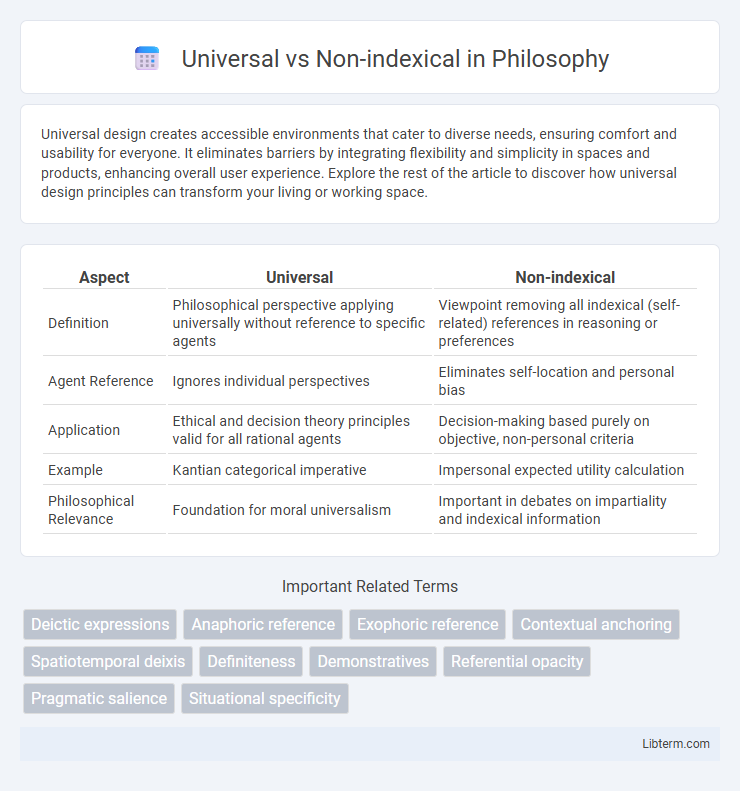Universal design creates accessible environments that cater to diverse needs, ensuring comfort and usability for everyone. It eliminates barriers by integrating flexibility and simplicity in spaces and products, enhancing overall user experience. Explore the rest of the article to discover how universal design principles can transform your living or working space.
Table of Comparison
| Aspect | Universal | Non-indexical |
|---|---|---|
| Definition | Philosophical perspective applying universally without reference to specific agents | Viewpoint removing all indexical (self-related) references in reasoning or preferences |
| Agent Reference | Ignores individual perspectives | Eliminates self-location and personal bias |
| Application | Ethical and decision theory principles valid for all rational agents | Decision-making based purely on objective, non-personal criteria |
| Example | Kantian categorical imperative | Impersonal expected utility calculation |
| Philosophical Relevance | Foundation for moral universalism | Important in debates on impartiality and indexical information |
Introduction to Universal and Non-indexical Concepts
Universal concepts refer to ideas or properties that apply consistently across different contexts and individuals, independent of personal perspective or specific situations. Non-indexical expressions convey information without relying on the speaker's context, time, or place, enabling objective and universally understandable communication. Understanding these foundations is crucial for fields like logic, linguistics, and philosophy, where distinguishing context-independent meaning enhances clarity and analytical precision.
Defining Universal Language Features
Universal language features refer to structural or functional elements found consistently across all human languages, such as recursion and basic syntactic categories, while non-indexical features focus on aspects independent of context or speaker identity. Defining universal language features involves identifying innate grammatical principles underlying diverse languages, supporting theories like Noam Chomsky's Universal Grammar. These core features facilitate cross-linguistic comparisons and computational modeling by standardizing syntactic, phonological, and semantic components applicable to any language.
Understanding Non-indexical Elements
Non-indexical elements in language refer to expressions whose meaning remains constant regardless of context, contrasting with universal terms that apply broadly but may still depend on contextual variables. Understanding non-indexical elements involves recognizing words or phrases like "water" or "triangular," which do not shift meaning based on speaker or time, making them crucial in semantic analysis and logical form. This distinction enhances clarity in linguistic interpretation and formal semantics by isolating invariant meanings from context-dependent references.
Key Differences Between Universal and Non-indexical
Universal statements apply universally across all contexts without reference to specific situations, making them consistent and context-independent. Non-indexical expressions lack contextual or speaker-related references, allowing their meanings to remain constant regardless of who utters them or when. The key difference lies in universality addressing scope of application, while non-indexicality pertains to the absence of contextual anchoring in meaning.
Examples of Universal Constructs
Universal constructs in programming, such as loops and conditional statements, function consistently across different contexts, enabling code reusability and predictability; examples include the "for" loop in Python and "if" statement in JavaScript. Non-indexical constructs, in contrast, depend on specific context or index values and produce varying outcomes, seen in array access with index variables or context-dependent lambda expressions. Universal constructs facilitate writing portable and maintainable code by abstracting complexity into standardized patterns applicable across multiple environments.
Examples of Non-indexical Usage
Non-indexical usage exemplifies statements that remain constant in truth value regardless of the speaker's context, such as "Water boils at 100degC at sea level" or "The Earth orbits the Sun." These examples illustrate how non-indexical sentences convey objective facts unaffected by temporal, spatial, or personal perspectives. The distinction from universal statements lies in non-indexicality's emphasis on context-independent truth rather than logical generality.
Linguistic Significance of Universality
Universal linguistic elements reveal patterns and structures shared across languages, enabling deeper understanding of human cognition and communication. Non-indexical expressions maintain consistent reference independent of context, crucial for preserving meaning in diverse discourse environments. Emphasizing universality in language facilitates cross-linguistic comparison and advances theoretical models of semantic interpretation.
Contextual Applications of Non-indexicality
Universal propositions assert truths applicable in all contexts, while non-indexical statements maintain consistent semantic content regardless of the speaker's perspective or temporal situation. Non-indexicality proves crucial in philosophical logic and linguistics, especially for analyzing statements about belief, knowledge, and probability without reference to particular agents or times. Contextual applications of non-indexicality enhance clarity in communication across varying contexts by isolating content from subjective or situational factors inherent in indexicals.
Impact on Communication and Interpretation
Universal language frameworks enhance clarity and consistency in communication by providing shared reference points, reducing ambiguity across diverse audiences. Non-indexical expressions, lacking context-dependent references, promote objectivity but may limit nuanced interpretation and spontaneity in conversational exchanges. The balance between universal and non-indexical elements significantly influences interpretative accuracy and effective message transmission across cultural and linguistic boundaries.
Conclusion: Choosing Between Universal and Non-indexical Approaches
Choosing between universal and non-indexical approaches depends on the context of application and desired interpretative flexibility. Universal methods provide consistent, objective frameworks suitable for broad applications, while non-indexical approaches allow for more subjective, context-dependent interpretations that can capture nuanced perspectives. Evaluating the trade-offs between objectivity and contextual sensitivity is crucial for selecting the approach that best aligns with specific analytical goals.
Universal Infographic

 libterm.com
libterm.com